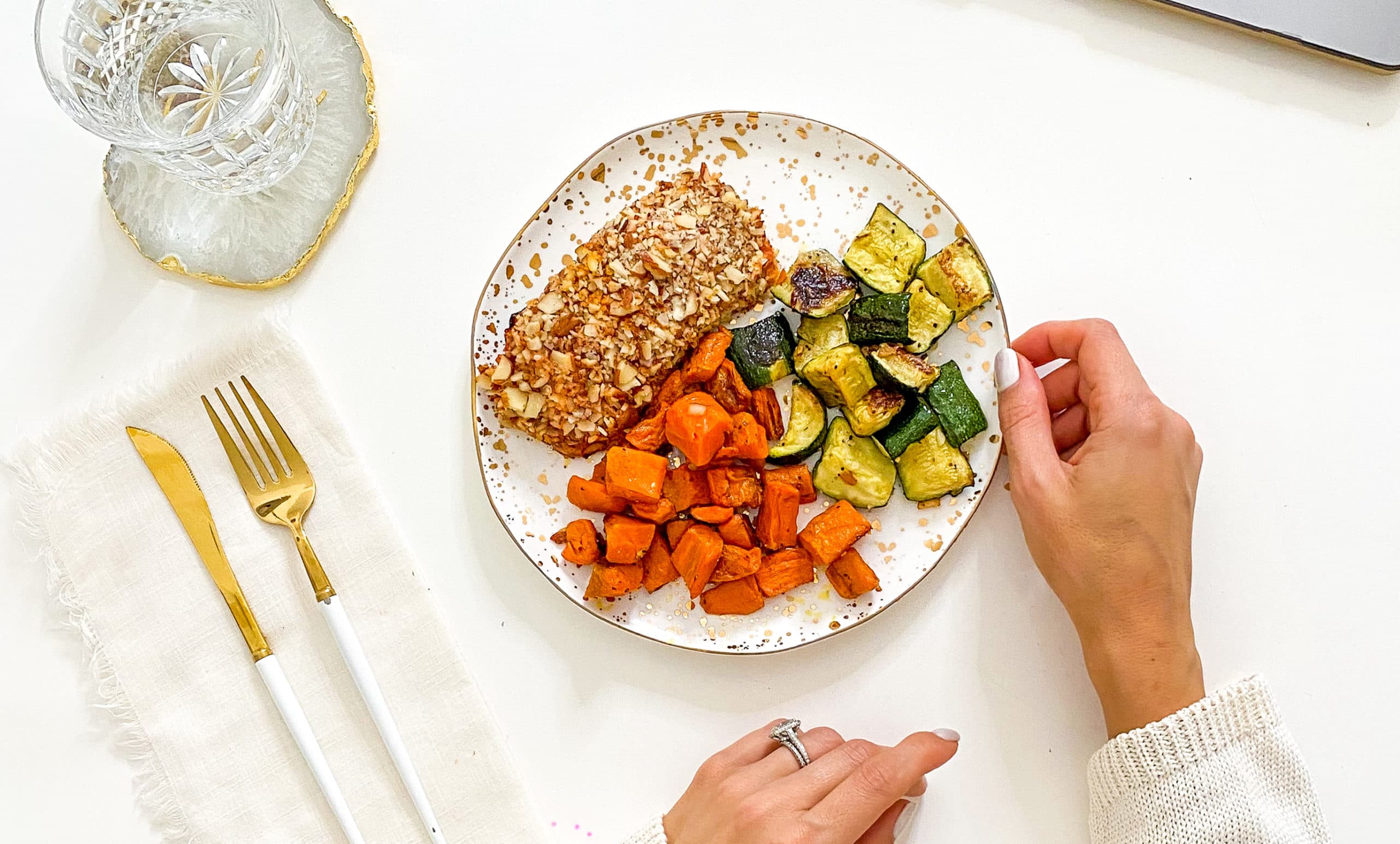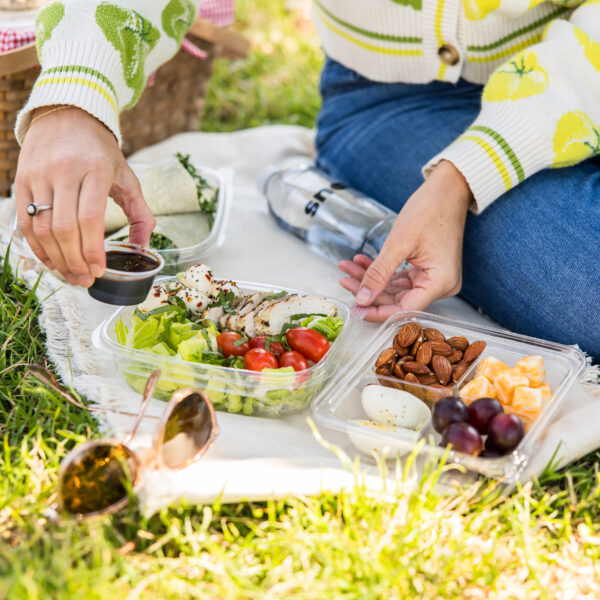Look, we know that weight loss is a tricky and often sensitive subject. Here at Snap Kitchen, we’re here to support your goals, whatever they may be, and help you achieve them healthily and sustainably. We’re your partner in health, after all.
That means we want to help cut through the nutrition noise and give you real, actionable advice to help you be your best self. So we figured we’d bring in one of our registered dietitians, Sam, to give you the scoop on a healthy meal plan to help you lose weight the sustainable way.
The Healthy Meal Planning Basics
I’ll start by saying that there is no one-size-fits-all when it comes to healthy living, and the same is true for weight loss. We’re all bio-individual, which means that what works for one person may not work for another. But there are a few basic nutrition tenets that will help you feel your best and lose weight along the way.
1. Incorporate healthy fats.
You may be wondering how it’s possible to lose fat if you’re eating fat, but fat is crucial to keeping our body and mind healthy and happy. Fat is essential for brain function and body hormone health, and it also helps balance blood sugar, another essential piece of the weight loss puzzle. Healthy fat sources include extra virgin olive oil, avocado oil, olives, avocados, nuts and seeds, coconut oil, grass-fed butter or ghee, coconut, high-quality dairy or meat, and wild-caught fish. Avoid options like canola oil, corn oil, sunflower oil, and soybean oil.
2. High-quality protein.
If your goal is weight loss, it’s crucial to eat enough protein. Not only is a protein the most satiating macronutrient when compared to fat and carbohydrates, but it also takes energy to digest and absorb. This is called the thermic effect of food. It takes about 20-35% of the energy you consume from protein for your body to utilize that protein properly. Pretty cool, huh? Protein also helps you maintain muscle as you age, and muscle burns more than fat at rest. It also reduces ghrelin, a hormone that makes you feel hungry, and increases other hormones that signal fullness.
3. Eat lots of veggies!
Vegetables are incredibly nutrient-dense, with fiber, phytonutrients, antioxidants, and so much more. When it comes to weight loss, one roadblock is often nutrient deficiencies. Not getting enough of a variety of nutrients can mean that your body doesn’t have what it needs to perform optimally. Eating a variety of colorful veggies can help ensure you’re getting adequate nourishment. A high-quality multivitamin can also be a great insurance policy when it comes to nutrient status.
4. Drink enough water.
Aim to drink at least ½ your body weight in ounces each day. Water is essential to our survival, as almost all of our body’s major systems depend on water to function. Water regulates body temperature, lubricates joints, helps flush waste products out of the body, carries nutrients and oxygen to the cells, and so much more. If you’re eating lower carb, exercise regularly, or sometimes struggle with dehydration, flavored electrolytes are a good option to encourage hydration.
5. Eat less often.
Unfortunately, the idea of eating many small meals throughout the day is one that’s been thrown around for a long time, with proponents saying it revs up your metabolism. While this way of eating may work for some people, like those who are breastfeeding, trying to gain weight, or competitive athletes, the average person should aim for three meals a day instead. Especially here in America, people tend to eat too frequently. When you eat every few hours, your insulin levels are continually elevated, which actually impedes fat loss because your body can’t tap into using stored fat for fuel.
Additionally, it’s a lot of work to think through what your meals will be if you’re eating 5+ meals a day! By giving your body time to rest & digest between meals, not only do you help improve insulin sensitivity, but you also allow your digestive system a rest. This is key for any repair or clean-up that needs to go on post-meal. If you’re curious about this process, read up on the migrating motor complex!
6. Make sure you eat enough.
It always makes me sad when women tell me they’re on a super low-calorie crash diet or that their doctor told them to eat 800 calories a day to lose weight. The advice to eat less, move more, though well-intentioned, isn’t usually helpful and falls flat.
While the amount of calories you eat does matter to some extent, that’s not the only factor important for weight loss. Often, by over-restricting calories, you actually put your body in a stressed state. On top of that, your body enters scarcity mode, unsure of when it may get fed again. Because of this, it’ll hold onto excess fat and work to be more efficient with the calories you give it, meaning metabolism and fat burn slow down.
Time and time again, I’ve seen that when people stop strictly reducing calories and instead focus on the quality of the food they’re consuming, they see results after having “plateaued” for months. Plus, it’s a lot more fun to eat more food, not less! And in the end, a sustainable solution (aka not an 800-calorie crash diet) is what will help you maintain your results in the long-term. Here at Snap, we’re fans of lifestyle changes over diet dogma.
Your Weight Loss Meal Template
Now, let’s talk about how to build your plate in a balanced and healthy way. Building your meals this way will help balance your blood sugar, keep you full, and nourish your body and mind. You’ll naturally lose weight, too, if that’s your goal.
- Make about ½ your plate non-starchy veggies.
- Incorporate at least 4-6oz of high-quality protein per meal.
- Eat 2-3+ servings of healthy fat per meal.
That’s it! If meal prep is your thing, it can help plan meals ahead of time and prep them on a day off from work.
And if all of this feels like a little more than you want to wrangle, Snap Kitchen can help. We’ve got nutritionist-directed, pre-prepared meals with the nutrients you need to power through your day and reach your goals. View our healthy rotational menu.





Leave a Reply
No Comments